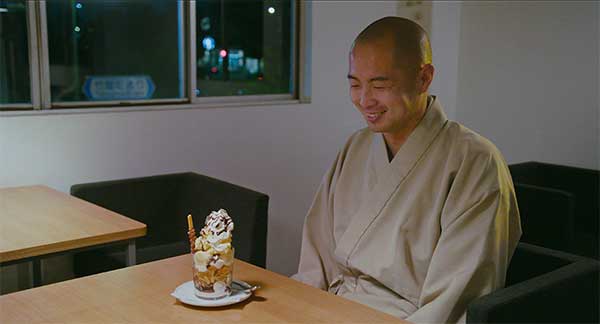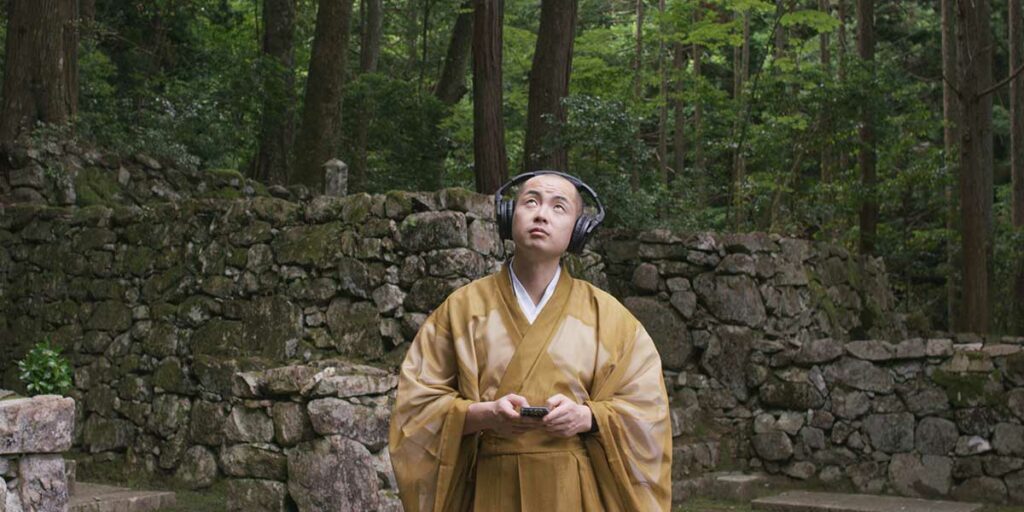In Crows Are White, director Ahsen Nadeem visits a secretive Buddhist sect in Japan to shed light on humanity, religion, and what makes life worth living.
Crows Are White documents writer, director and producer Ahsen Nadeem’s visit to an isolated Buddhist monastery on Mount Hiei, east of Kyoto, Japan, where a community of monks has been performing dangerous acts of extreme physical endurance for 1,200 years in order to pursue “enlightnment, the highest form of truth”. As he spends time with these monks, the director learns about their traditions and rituals, but his visit is also an attempt to find answers to a much more personal matter, or, as he puts it, “the mess [he] left back home.” This “mess” has to do with the “double life” the director feels he’s been living, as a result of having kept his relationship with a non-Muslim woman from his very religious parents for years. In fact, Nadeem’s own identity has been shaped by a very strict Muslim upbringing as well as the experiences he made first in Ireland, where his family immigrated from Saudi Arabia during the Gulf War, and then in the United States, where he went to college. If Nadeem initially embarked on a trip to Japan to visit this secretive, secluded monastery and find out about “enlightenment” and religion, it’s not long until his trip turns into a journey of self-discovery, and his own personal troubles take over.
At first, one might consider these two issues – the monks’ search for enlightenment and Nadeem’s dilemma on whether or not to come clean to his parents – to have little in common with one another, but the filmmaker’s decision to ask the monks for advice is not completely devoid of sense: after all, we usually think of religious figures as incredibly wise people who have the ability to look into our soul and know exactly what we need. But if you’re expecting a Katsumoto-style lesson on bushido à la The Last Samurai, think again. The monks Nadeem meets are certainly mysterious and fascinating enough, but they’re also extremely selective as to what they choose to share with the director.
What they take pride in is explaining just how dangerous and exhausting their rituals are: a seven-year long marathon (“kaihōgyō”) requires them to commit suicide if they don’t walk every night for 1,000 years, covering the same distance as the circumference of the Earth, with the aim of becoming a living Buddha. And then there’s a practice that forbids them to sleep or lie down for three months while chanting the same phrase over and over again, a ritual that is so dangerous and extreme that “a monk died during this practice because his legs decayed,” and “his dying wish was for the practice to be abolished,” as another monk cheerfully explains.
When asked about why they do all of this, the monks talk about abstract concepts like truth, enlightenment, freedom and sacrifice, and have plenty of sayings to recite. “You can achieve anything if you are willing to die for it,” a monk tells us, explaining that “people are controlled by their desires,” and that this “weakness” can be overcome by “tolerating undersirable situations.” Another monk tells us that one should never question their master’s opinion, even if what they say is clearly wrong, and an advert informs us that to “live a life of peace” is to be “free from greed and desire.” And yet, in between all of this sacrifice and physical exhaustion, there’s very little wisdom to share with Nadeem. Each time the director tries to ask them about his or their own personal feelings and thoughts, the monks either refuse to answer or don’t seem to understand why the questions were asked in the first place.

It’s a very carefully constructed image of themselves that the monks decide to show, and our struggle to understand their traditions is certainly connected with our Western attitude and culture. The director lets us make up our own minds as to what we should think of the monks’ lifestyles, always approaching the community with respect, and one message that comes across is that the way to “enlightenment” requires time, effort and sacrifice, and that all the physical exhaustion and sleep deprivation serve a bigger spiritual purpose for these monks.
The main shift in the film’s tone comes when the director meets a monk named Ryushin, who is not only into very unmonkly things such as heavy metal bands and ice cream, but who is also honest, brave, and declaredly unhappy enough to admit that the life he leads feels like a cage, and that he’d much rather go out and enjoy himself. Ryushin is not afraid to have desires and shows Nadeem his real self, which leads to an instant, one-of-a-kind friendship that forms between two people who have led very different lives but who also have a lot in common, starting from the fact that they are both trying to escape the cages in which they find themselves. Naseem and Ryushin end up learning a lot from one another; their friendship evolves as they find themselves in different situations, and we see them grow, make decisions, and give each other advice.
Crows Are White is as much a documentary as it is a personal journey for the director: while we find out about the monks’ marathons and vows of silences, we also learn about Nadeem’s own life, and that is what makes the documentary an interesting, if divisive, hybrid. On one hand, Nadeem’s filmmaking is so earnest that we’re always engaged, regardless of whether he’s learning about secretive Japanese monasteries or talking to his own family on Zoom. In fact, it is this connection established between the monks’ traditions and the director’s own difficulties with his religious upbringing that shows us that, though everyone’s traditions and beliefs are different, certain issues we face as human beings are universal.
Yet, on the other hand, there’s also a point when the documentary becomes a little too personal, deviating so much from its initial investigation on love, religion and tradition that it feels like the film itself acts as a form of therapy for the director, who is clearly so worried about his own struggles that he can’t help but use the little time he’s been granted with the most secluded monks to keep going on about his own situation – something the monks understandably have nothing to say about, since Nadeem is clearly the one who should be deciding how to handle his own situation. Throughout the film, we are also shown several Zoom calls with his girlfriend and family, and not only do they feel either a little too personal or pretty irrelevant to the film’s message, but it’s also unclear if Nadeem’s parents knew that those calls were going to be used in the film, at the time. There’s also an important scene in which Nadeen makes a revelation to his parents, and the issue here isn’t just the fact that we didn’t really need to see this in order to understand the message of the film (a message that was already clear the first time the director’s dilemma was mentioned), but also how this very personal, distressing moment was knowingly taped for the the purpose of making art, which begs to question the ethics of it all.
If we take the same non-judgemental approach to Crows Are White that the director afforded the monks, it becomes quite evident that the film itself was, indeed, a means for Nadeem to process his own trauma: the visit to the monastery must have brought up so many issues for Nadeem that, halfway through the film, the audience took second place, and the result is a film that feels disjointed and unfocused, presenting an image of the director that changes by the time we get to the end. Still, and one has to admire the courage it takes for someone to confront their fears on camera, and be ready to face the consequences of their actions. After all, this is exactly the kind of bravery snown by Ryushin in the film: the only outsider in the community is also the only one who’s found a way to be “comfortable living with his contradictions,” and who teaches us the most important lesson of all: living life is to be honest, to deal with problems, to make choices, and to really experience each moment, without depriving yourself of what makes you happy.
There’s so much to unpack in Crows Are White, and each viewer will take away a different message from it, depending on their own experiences and struggles. Some might choose to focus on the monks’ habits, and on whether or not it’s right to deny yourself the things you like. Others might look at the concept of “enlightenment”, and whether or not one’s life is worth living if it’s shaped by the constant need to prove one’s self, and experienced with the constant fear of failure and judgement. Others, again, might choose to explore the meaning of life itself, and whether we should ponder each decision we make or simply focus on experiencing each moment as it happens. And then there’s the role played religion in shaping our identity, and how extremely severe upbringings can trap us in invisible prisons that remain with us till our adult lives. To me, the film is about all of the above, but it’s also about our extremely human need to ask for help: even though Nadeem’s journey starts at the monastery, what Crows Are White is really about is the director’s own need to be loved and understood. Which is, after all, part of what makes us human.
Crows Are White premiered at SXSW 2022 on March 11, 2022.

